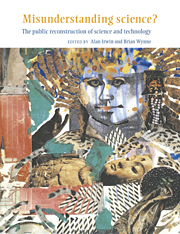Book contents
- Frontmatter
- Contents
- Acknowledgements
- Introduction
- 1 Misunderstood misunderstandings: social identities and public uptake of science
- 2 Science and Hell's kitchen: the local understanding of hazard issues
- 3 Disembodied knowledge? Making sense of medical science
- 4 Now you see it, now you don't: mediating science and managing uncertainty in reproductive medicine
- 5 Ignoring science: discourses of ignorance in the public understanding of science
- 6 Insiders and outsiders: identifying experts on home ground
- 7 Authorising science: public understanding of science in museums
- 8 Nature's advocates: putting science to work in environmental organisations
- 9 Proteins, plants, and currents: rediscovering science in Britain
- Conclusions
- Notes on contributors
- Select bibliography
- Index
5 - Ignoring science: discourses of ignorance in the public understanding of science
Published online by Cambridge University Press: 16 October 2009
- Frontmatter
- Contents
- Acknowledgements
- Introduction
- 1 Misunderstood misunderstandings: social identities and public uptake of science
- 2 Science and Hell's kitchen: the local understanding of hazard issues
- 3 Disembodied knowledge? Making sense of medical science
- 4 Now you see it, now you don't: mediating science and managing uncertainty in reproductive medicine
- 5 Ignoring science: discourses of ignorance in the public understanding of science
- 6 Insiders and outsiders: identifying experts on home ground
- 7 Authorising science: public understanding of science in museums
- 8 Nature's advocates: putting science to work in environmental organisations
- 9 Proteins, plants, and currents: rediscovering science in Britain
- Conclusions
- Notes on contributors
- Select bibliography
- Index
Summary
Introduction
The starting-point of this chapter is the observation that people do not simply possess knowledge about scientific ‘facts’ and scientific procedures and processes, they can also reflect upon the epistemological status of that knowledge. In addition, I argue that this active reflection can directly affect their responses to science and scientific experts. In feeling uncertainty about their understanding of science, or in identifying a ‘lack’ in their knowledge, people are making tacit judgements in relation to the authoritative source or sources of that knowledge. Thus people can review the standing of their scientific and technological knowledge in relation to some more or less expert source such as scientists, the media, friends and relatives, and so on. As such, identity cannot but be implicated. Conversely, the ways in which people regard themselves and the value they place upon their scientific knowledge, affects the ways in which they understand science. We have, therefore, a sort of discursive jigsaw in which identity, the status of lay scientific knowledge, and scientific expertise are delimited.
This chapter will, first of all, briefly examine three approaches to the public understanding of science which are essentially interested in describing the scientific knowledge that people ‘possess’. The fact that these approaches ignore issues concerning the reflexivity and identity of lay people, suggests their underpinning model of the individual is fundamentally mechanistic. The implication is that a particular representation or narrative of the lay person is promoted; in some cases, this is further disseminated through the media. These ‘knowledge description’ approaches will then be contrasted with a social constructionist/discourse analysis of the public understanding of science. Further, I will focus on one particular facet of the public understanding of science.
- Type
- Chapter
- Information
- Misunderstanding Science?The Public Reconstruction of Science and Technology, pp. 107 - 125Publisher: Cambridge University PressPrint publication year: 1996
- 61
- Cited by



